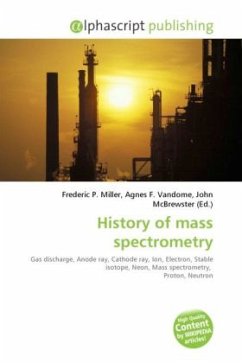The monoisotopic mass is the sum of the masses of the atoms in a molecule using the unbound, ground-state, rest mass of the principal isotope for each element instead of the isotopic average mass.For typical organic compounds, where the monoisotopic mass is most commonly used, this also results in the lightest isotope being selected. For some heavier atoms such as iron and argon the principle isotope is not the lightest isotope. The term is designed for measurements in mass spectrometry primarily with smaller molecules. It is not typically useful as a concept in physics or general chemistry. Monoisotopic mass is typically expressed in unified atomic mass units, also called daltons.
Bitte wählen Sie Ihr Anliegen aus.
Rechnungen
Retourenschein anfordern
Bestellstatus
Storno








